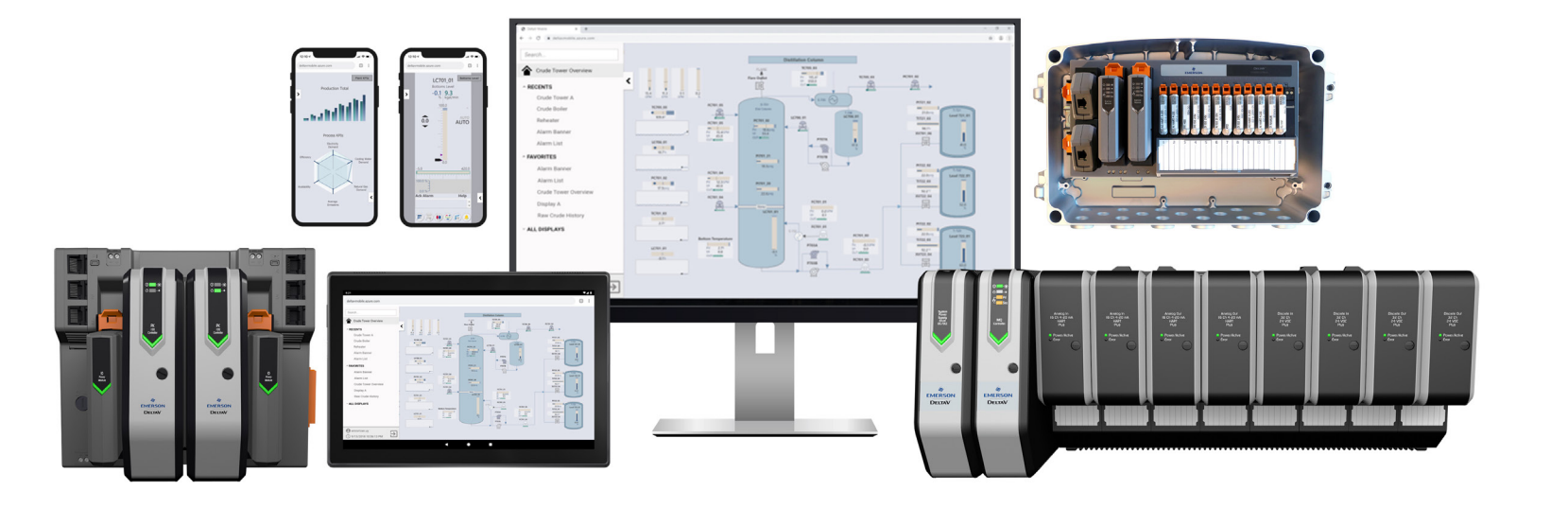The DeltaV™ Distributed Control System (DCS), developed by Emerson, is a modern, highly integrated process automation platform designed to help industrial enterprises optimize operational performance, reduce project risk, and enhance production efficiency and safety. Renowned for its ease of use, flexibility, and reliability, the system is widely used in process industries such as oil and gas, chemicals, pharmaceuticals, power generation, and food and beverages.
By integrating advanced predictive technologies, intelligent control algorithms, and an intuitive human-machine interface (HMI), the DeltaV DCS enables efficient connectivity between personnel, processes, and production. Its core design philosophy is "simplification," aiming to reduce engineering complexity, decrease implementation time, and provide continuous support and optimization throughout the entire plant lifecycle.
Key System Features
1. Simplified Engineering and Configuration
The DeltaV system uses a unified engineering environment that integrates alarms, batch control, advanced control, safety systems, and historical data logging. Users can quickly set up the system using out-of-the-box templates and modular configuration libraries, significantly reducing engineering effort and time without requiring deep specialized knowledge.
2. Electronic Marshalling Technology
Traditional I/O wiring methods often require extensive cross-wiring in control cabinets. DeltaV's Electronic Marshalling technology allows field cables to be landed regardless of signal type or control strategy. This decouples process design from I/O infrastructure design, greatly facilitating late-stage changes and minimizing re-design and re-wiring efforts.
3. Intuitive Operator Interface and Human-Centered Design (HCD)
The DeltaV system adopts a Human-Centered Design (HCD) approach, providing intuitive and customizable operator interfaces. Operators can quickly access critical information, identify abnormal situations, and take appropriate actions. The system also supports HTML5 graphics, enabling seamless use on various devices such as desktops, tablets, and smartphones, enhancing operational flexibility and responsiveness.
4. Embedded Advanced Control Applications
DeltaV includes built-in advanced control applications such as model predictive control (MPC), adaptive tuning, neural network control, and fuzzy logic control. These applications run directly in the controller without additional configuration or data mapping, significantly improving control loop performance, reducing process variability, and enhancing product quality and throughput.
5. Comprehensive Alarm Management
The system provides built-in alarm management and analytics, including dynamic alarm flood suppression, alarm help information, alarm classification, and audit trails. Operators can respond quickly based on alarm priority, status, and area of responsibility, avoiding operational errors due to alarm overload.
6. Integrated Historians
DeltaV offers multiple historian options, including Continuous Historian, Advanced Continuous Historian, and Enterprise Historian. These tools accurately capture system events, alarms, and user actions, and integrate seamlessly with enterprise data platforms such as OSIsoft PI Server, supporting efficient data analysis and decision-making.
7. Mobile Operations Support
With DeltaV Mobile, users can view real-time process data, trends, alarms, and batch information on mobile devices, enabling remote monitoring and collaboration, thereby improving operational flexibility and response capabilities.
8. Virtualization and Simulation Support
DeltaV Virtual Studio supports the deployment, testing, and training of control systems in a virtual environment. Control logic validation and operator training can be completed without physical hardware, significantly reducing project risk and cost.
9. Security and Network Protection
The DeltaV system is ISASecure SSA Level 1 certified and complies with IEC 62443 standards. It incorporates multiple layers of security protection, including network segmentation, port lockdown, user authentication, intrusion detection, and automated patch management, ensuring the control system is protected against cyber threats.
10. Batch Process Control
Based on the ISA S88 standard, DeltaV Batch provides a fully integrated batch solution supporting recipe management, equipment allocation, real-time quality prediction, and automated reporting. It is suitable for a wide range of batch processes, from pilot plants to complex production lines.
System Principles and Architecture
1. Distributed Control Architecture
The DeltaV DCS adopts a distributed control architecture, decentralizing control functions across multiple controllers, each responsible for a specific area or unit. This architecture enhances system reliability and flexibility—a failure in one controller does not affect the entire system.
2. Unified Database and Engineering Environment
The system uses a unified global database to manage all configuration information, eliminating data mapping issues between multiple databases. Engineering tools such as DeltaV Explorer, Control Studio, and Diagnostics provide a complete system view and online debugging capabilities, supporting both local and remote configuration.
3. Smart Field Device Integration
DeltaV supports multiple communication protocols, including HART, FOUNDATION Fieldbus, WirelessHART, Profibus, and DeviceNet, enabling plug-and-play integration with smart field devices. Device status and diagnostic information can be directly uploaded to the control system, supporting predictive maintenance and real-time optimization.
4. Electronic Marshalling and I/O Flexibility
Through CHARMs (Characterization Modules) technology, DeltaV enables signal-type-independent I/O termination. Users can connect any type of signal at any location, supporting distributed I/O deployment and significantly reducing cabling costs and installation time.
5. Controllers and Hardware Platforms
DeltaV offers multiple controller options, including M-Series, S-Series, and PK Controllers, supporting hot-swapping, redundancy, and wireless I/O. The PK Controller is particularly suitable for small-scale skid systems and can operate standalone or integrate seamlessly into a plant-wide DeltaV system.
6. Cybersecurity and Reliability
The system isolates the control network from the enterprise network entirely, using smart switches and firewalls to prevent unauthorized access. Built-in security features include user authentication, operation auditing, and file integrity checking, ensuring system stability even under cyber threats.
7. Simulation and Training Environment
DeltaV Simulate provides full control system simulation capabilities, supporting virtual operation of controllers, I/O, and SIS logic. It can be used for control strategy validation, operator training, and system testing, significantly improving project success rates and safety.
Reference:https://www.emerson.com/documents/automation/brochure-deltav-dcs-platform-deltav-en-7217850.pdf
![微信图片_20250910151442 微信图片_20250910151442]()
![微信图片_20250910151609 微信图片_20250910151609]()



